- Published on
"Microoffices" vs "Officeolith"
- Authors
- Name
- Damian Płaza
- @raimeyuu
The Oracle
We, developers and architects, tend to think about modularity. Scale. Evolvability. Flexibility.
Predicting the future so that our design is robust. Anti-fragile.
Those are the traits we seek when facing the problem.
While business people are dreaming of neverending stream of value, being delivered through product that effortlessly and costlessly could react and adapt to the market changes, we, technologists, try to provide tools supporting such dystopian vision.
We all know that, right?
No tech around us
Taking into account that we could think of our system as an Organization, I wonder what would happen if we could imagine an evolution of a new business. Wouldn't observing all the decisions made on each step be thrilling? What we could learn?
Let's spin up creativity cluster and jump into the wilderness of completely making up a business tale! Here we go!
Bear in mind I have never, ever, experienced business development myself.
No company was harmed during writing this tale.
Meet Jack, "CLeaner"
Warm applause for Jack, the founder of a tiny, single person company called "CLean Inc.".
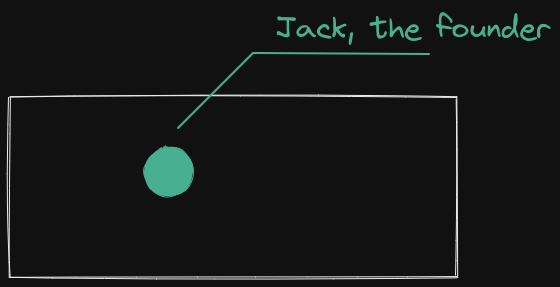
As you see, he has a tiny, bit empty office, because he just started his entrepreneurship.
He wants to conquer the world with his cleaning skills and lean attitude to the business.
Jack works alone, trying to serve his customers in the most competent manner.
Too much on the plate
Turns out, Jack knows how to work in the cleaning market. He has some experience with talking to cleaning products companies so soon he sees opportunities with starting the partnership with some of them.
Customer base grows, Jack can't clone himself. The decision is made - he needs to hire another person.
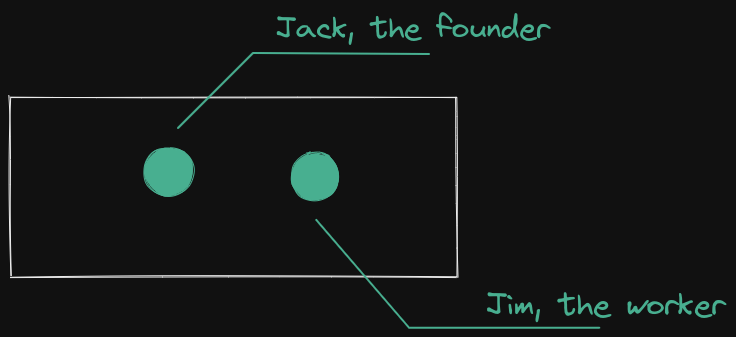
Say hi to Jim, the worker. He knows cleaning business quite well and he's not afraid of working hard to achieve the best quality of the service.
This is something that Jack, the founder, really liked in Jim - the spark in the eye when vacuuming the floor.
Jack was thinking if Jim should have his own office, but it didn't add up - this costs and still they work closely together.
There is no point of putting a wall between them.
Three is more than two
Months were passing rapidly and both Jack and Jim couldn't keep up with growing demands from the market.
New cleaning products, new methods of vacuuming, new approaches to window polishing - each customer has its own wishes.
Jack, the founder, decided again - "CLean Inc." needs a new cleaning talent.
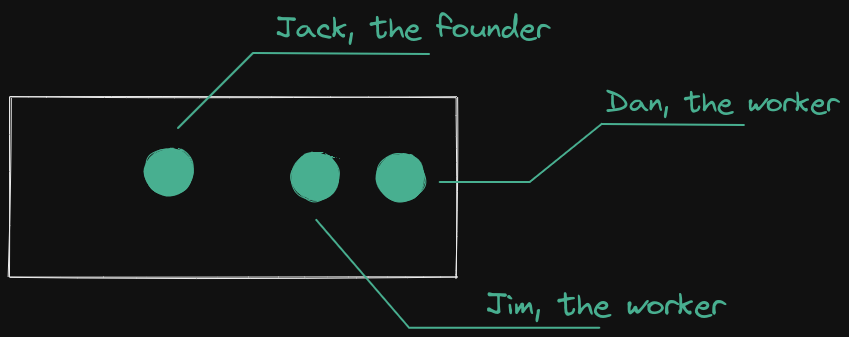
That's how Dan got the job. Jack saw how Dan is wholeheartedly servicing the customer on his trial day. That made the difference.
Well, Jack had this thought again - three people in the single office. How unprofessional. Probably other cleaning companies are having luxurious and spacious rooms for each of the individual.
But Jack made a tough decision - what's the point of putting each of them in the "box" as they need to communicate efficiently about what are the plans.
The CLeaning Squad
Is there something better than success? MASSIVE success.
Soon, "CLean Inc." started becoming a benchmark company for how cleaning quality should be provided.
When people started sharing contact to the Jack, the founder, the requests skyrocketed. He was so busy with answering the questions, taking the calls, he needed to stop cleaning at all.
This required growing the company. This is exactly what Jack did.
Meet "The Squad".
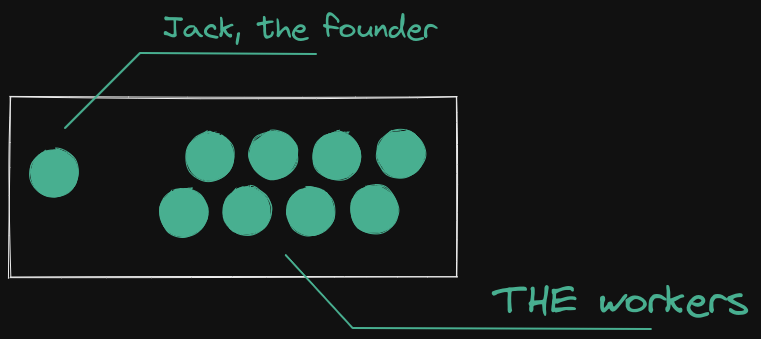
Jack and his "commandos" were widely recognized for the level of service they provided.
But things changed - "The CLeaners" were chatting about new formulas of cleaning products, recent news claiming that cleaning robots are better for doing room service than humans, and so on.
Jack, the founder, didn't have time for such activities. He realized he needs to focus on providing the correct plans and vision for the company, as they received more time in the spotlight.
Jack also observed that he no longer used "cleaning" language - he spoke about plans, mission, economy, budgeting.
Totally different realms.
He made the decision - it's time to get the new office for him. And as he wasn't into cleaning topics that much, he needed someone who will take care of the squad.
The Wall
This felt really good. Jack finally had calm time talking to customers, planning strategy for expansion.
He hired Tom, the cleaning squad manager. His main job was to organize the work for the workers.
He thought of moving the squad to another building, just to make sure they won't interrupt him too often.
It didn't add up - there was no point for renting new office space.
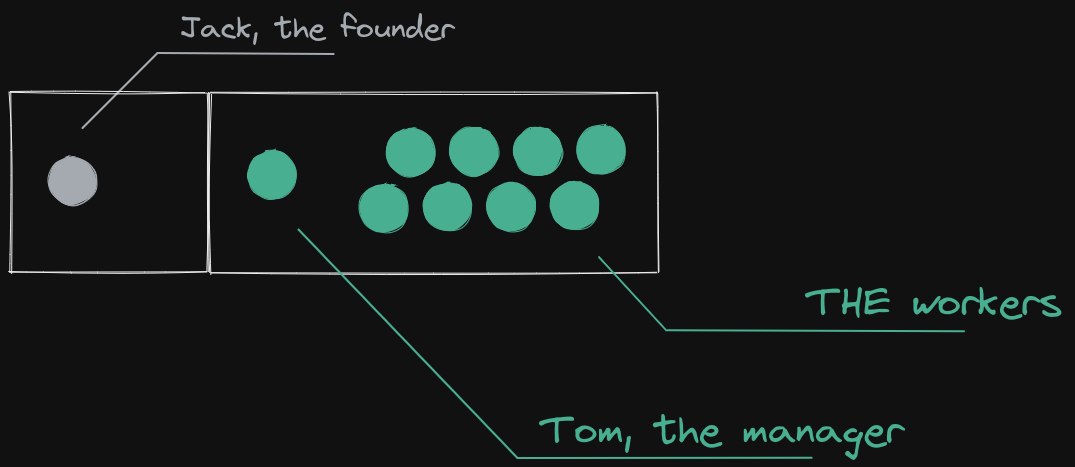
Everything was going so smoothly - Jack started marketing campaings that made his people even more busy.
He was really proud of the squad, the work that Tom did to make the cleaning service the best gift people could ever imagine.
But Jack started receiving feedback from the customers that sometimes a cleaner needs to go back and forth between the premise, where the cleaning service is given, and one of the shops having cleaning products. Such events made entire service taking longer than expected, impacting schedule of other customers.
Simply unacceptable.
This made Jack wondering.
No more delays
"How can we prevent delays caused by the need to refill cleaning product?" - that question was constantly in Jack's head for couple of days.
The founder was playing with the idea that one of the cleaners will get new responsibility to ensure that other cleaners have all the means for providing the service, before they drive to the place.
There were doubts about if a single person manages all the complexity. "Maybe I should get three more people into this responsibility?", he wondered.
It was a pure reasoning without evidence from the reality so Jack chose a single volunteer and started probing the solution.
He was very good observer - he noticed that this cleaner didn't have time for cleaning responsibilities and the majority of his time was consumed by thinking about stocking up products, optimizing space on the shelves in the cleaners room.
What's more, other "CLeaners" were a bit annoyed that he's constantly interrupting their discussions by carrying boxes with cleaning products.
That was a clear (pun intended!) signal for Jack - the cleaning guy not doing cleaning work needs to have his own room.
The good part was that all people were in the same building. It was easy to move things here and there.

From now on, Wim was responsible for keeping cleaning products available for cleaners so that they can be prepared before the actual work.
Lean approach
Turned out that Jack's idea was brilliant. Customers stopped complaining about delayed time for getting the service done.
What's more, they glorified "CLean Inc." for quickly responding to feedback. That made this little growing company really recognized.
"Lean approach for cleaning" - it became a known phrase used by the customers.
One day Jack, the founder, got a call from one of the delighted customers regarding floor conditioning product that was used by one of the cleaning commandos. The customer wanted to take chance and do some of the cleaning work by themselves.
Well, it didn't sound good. Jack thought that the customer wants to stop getting the service. However, this made a huge opportunity for reselling the products from his partners.
Single customer asked for such service, but what happens if Jack starts asking directly "do you need some cleaning products from our catalogue?".
He made couple of calls himself and turned out that there some potential there.
But Wim was very clear in his message - he can't keep up with the cleaning squad right now so there's no chance he manages to supply external parties.
Jack was also terrified with accounting of such endeavour. Up to now, he was able to do everything by his own, but putting more attention into supplying responsibility will devour even more of his precious time.
The next level of service
Jack, the founder, didn't wait. He hired bunch of new warehousing people, along with Winston, their manager. Additionally, to mitigate accouting issues, he hired Paul, the accountant.
Jack knew that Paul's work is totally different than cleaning work and supplying cleaning products - Paul got separate room. No one except Paul needed to know about the books, end of month, etc.
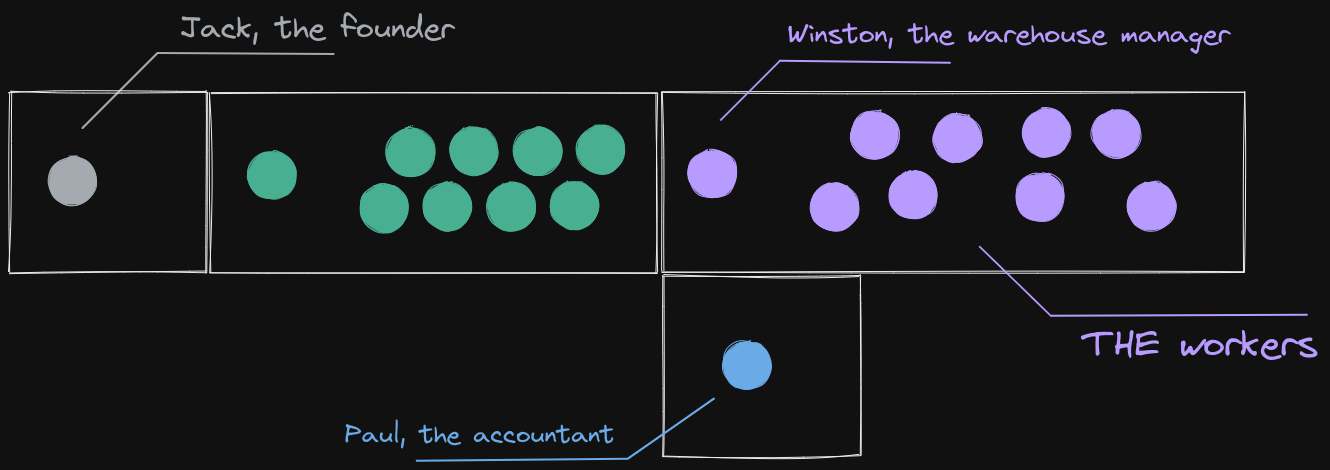
Did it work? Hell yeah.
Customers didn't stop getting cleaning services, but even wanted to get "all those great products" directly from the "CLean Inc.".
Soon, Jack, the founder, wasn't able to respond to all the shopping requests. He tried pretending he is able to handle everything - company strategy planning, thinking how to grow and do the selling part.
He got pretty tired. The decision was made - Jack won't be responsible for sales. This responsibility is going to be in hands of new team - THE Sales.
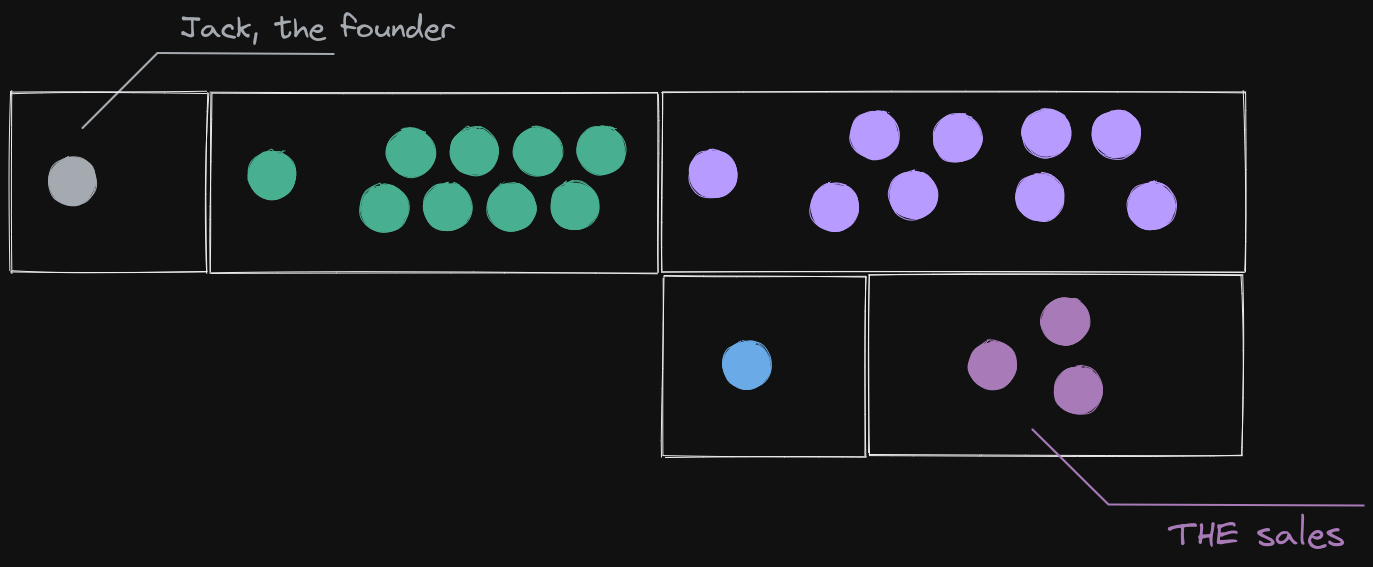
Sales people were very energetic, motivated and a bit too loud for Paul, there were speaking about KPIs, targets and so on. This was strong signal towards giving them their own office.
"CLeaner Winner"
Reaching sales goals were so surprising for Jack that he couldn't believe what's was happening.
"CLean Inc." was able to get another revenue stream. Everything looked like in the dream.
The cleaning squad was doing great, the sales were able to increase customer base even more, the supplies warehousing people got really busy.
"Some products we're getting from you are good, but not best" - the opinion that changed everything.
Jack read one of the e-mails from their customers. One could be sad that the customer wasn't happy, but Jack clearly saw the opportunity - "CLean Inc." will make new product that will be the number one in terms of cleaning.
Unfortunately, he didn't know anything about creating such products. Nothing.
Jack, the founder, started reading, searching the internet, asking people, but he wasn't expert in that. Such responsibility wasn't clearly his the highest competence.
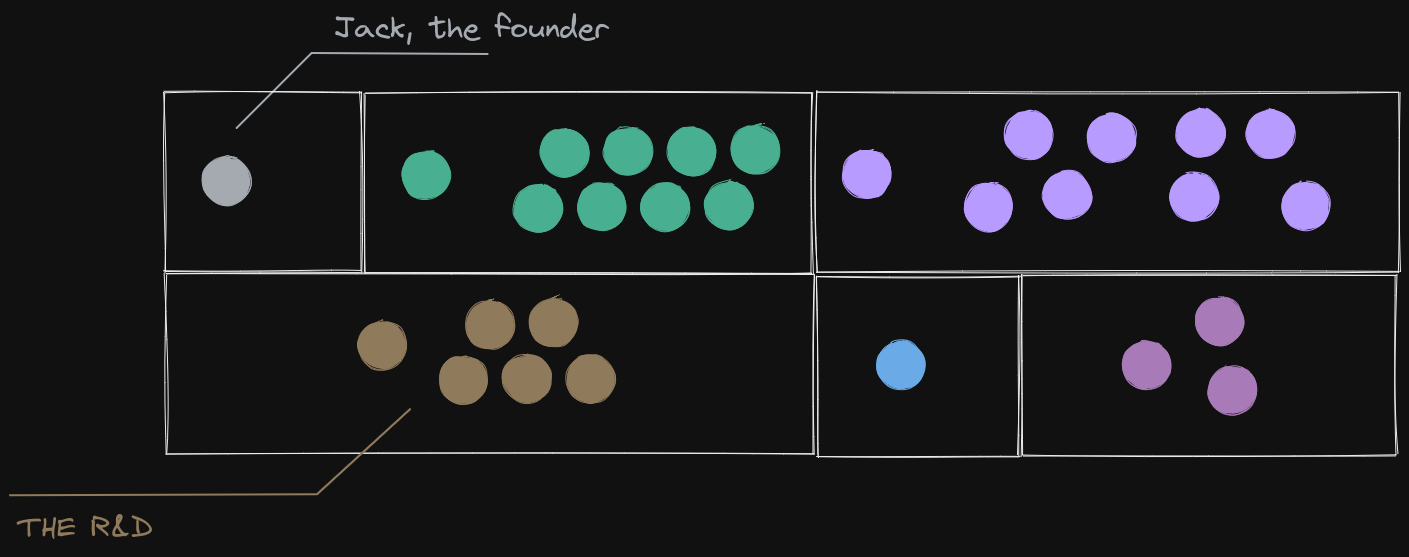
Exactly due to this reason the R&D crew was founded. Chemistry engineers, cleaning passionates were involved in this journey.
Jack was really happy. He had means to invest tons of money to be recognized not only by their perfection in servicing customers, but also for high-tech cleaning products.
He immediately knew that R&D people need to have calm workplace, far from the noise coming from the cleaning commandos, suppliers or always happy the sales team.
So they got their small lab to be creative and invent new products that will dominate the market.
That's how "CLeaner Winner" was made. Secret formula, full of strange names, was supposed to conquer establishment of the cleaning industry.
3...2...1...Production!
The manager of R&D was very clear - they know how to invent new formulas and think of products, but they can't bring them alive for huge scale.
Jack, the founder, was adviced that if he wants to make a real difference, they need to invest money in manufacturing. Tons of money. A simple reason was the effect of scale - they will be able to lower the costs by having their own production lines.
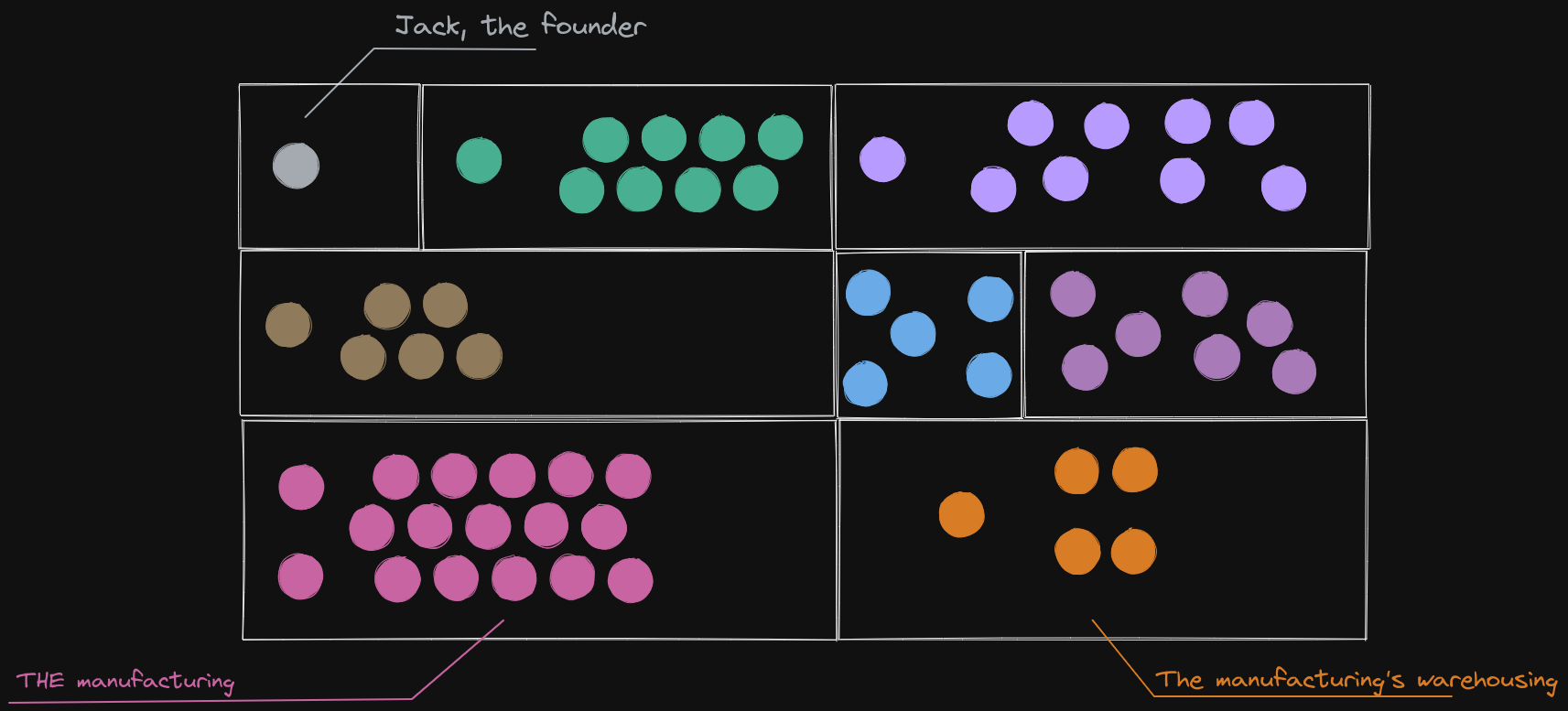
The founder didn't wait for more opinions. He felt he needs to go All in.
That's how product manufacturing and internal product warehousing teams were established.
After making the decision, it was known they both need to have their own space. The sounds of the machines, optimizing of the production, replanning the production lines - totally different world than the rest of the company.
Boom. "CLeaner Winner" started becoming the number one of the cleaning products. The response from the market was clear - it was the right decision.
Unfortunately, new problems started emerging. Due to the power consumption, enormously loud noise and sounds, other departments couldn't do their job efficiently.
Jack couldn't take more complains from the rest of the organization, so he decided that the manufacturing and its warehousing need to be in another building. Having two, distributed offices will alleviate some of the problems and this should make other parts of organization highly focused.
Additionally, accounting team get some new people on the board, because of the number of invoices piling up on Paul's desk.

"Send me an e-mail"
It became quite and calm, as before founding manufacturing and its warehousing. Distributing these responsibilities looked like a good decision.
Even though the problem of a loud neighbor disappeared, another issue arouse. R&D team was complaining about communication with manufacturers. Previously they could just go to their place and see how they are making things and ensure the right quality.
Now it's totally different. They are scheduling meetings, having calls and exchanging e-mails.
When the new batch is finally released, it takes time for the delivery guys to bring it for assessment. Suddenly, the distance between the sides became the problem.
Plagiarism
Other manufacturers were envy of the formula and started copying the ingridients. This made Jack furious. He immediately called other manufacturers threatening going to the court, but they just laughed.
There was a problem - Jack knew almost nothing about the legal part of manufacturing, plagiarism and so on.
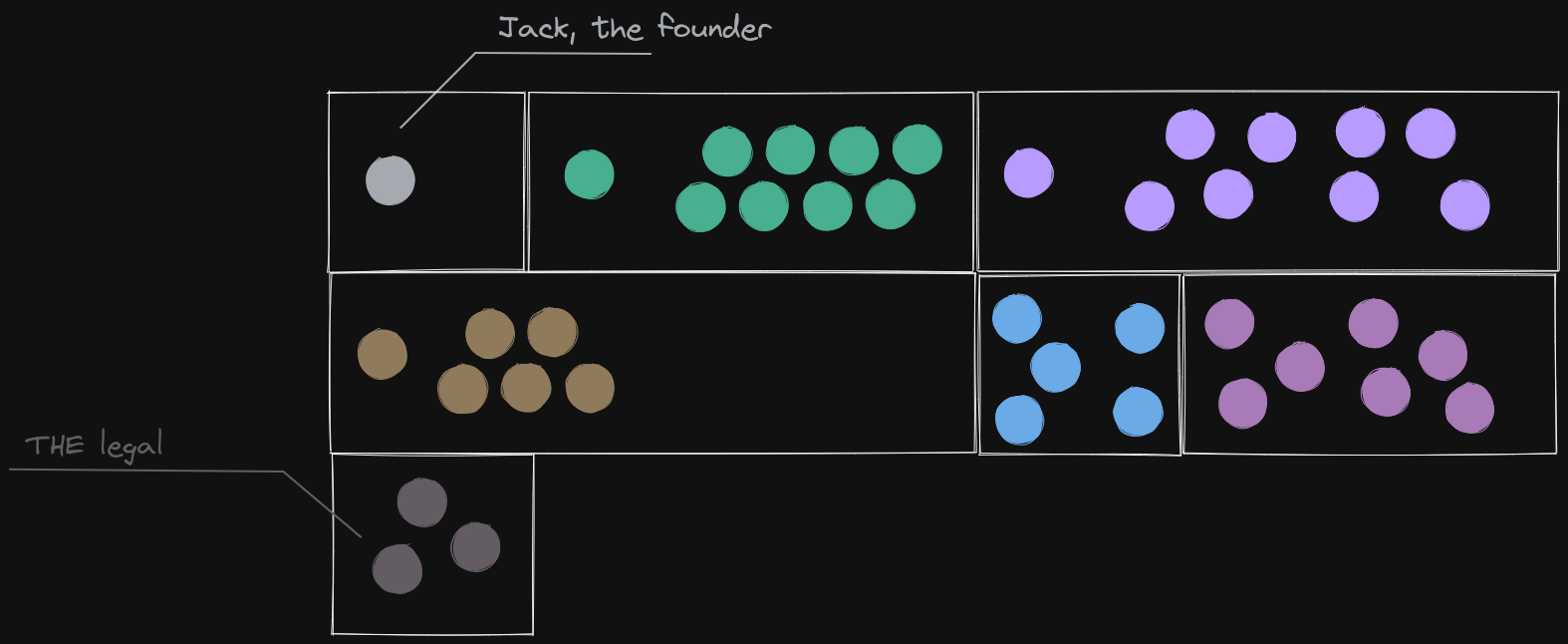
He didn't wait and hired the new team, responsible for legal activities. For sure this shouldn't be the responsibility of the founder to know such things. In order to have constant and quick communication line, they were placed closely to his office.
Research company
The legal people made Jack confident. He sensed they could become the leader of nanotechnology, when it comes to cleaning business.
Being reinforced by the legal, knowing that their intellectual property is properly secured, "CLean Inc." heavily invested in this branch of the industry.
This made things clear - R&D team needed to grow. High-end lab, full of expensive, advanced appliances was the clear goal.
The legal advised that industrial espionage is very typical, especially in the cleaning industry.
The decision was made - the lab needs to be secret and hidden from the world.

Soon, the lab was founded. Only chosen ones knew where it is located, but it was doing great.
Cleaning services, cleaning products got a new friend - cleaning research. In a few months, "CLean Inc." started giving advanced consulting for other companies, e.g. where tough conditions made cleaning very difficult.
Of course, communication suffered. Jack, the founder, observed that distributing the R&D team made him unaware of multiple topics.
Having separate office, "the lab", made them flexible in terms of space, power consumption.
But about cleaning services.
Autonomous bubble
Turned out that "The CLeaning Squad" was pretty isolated from the new areas of the company. They were providing services with the highest possible quality.
Keeping them in the single building was really wasteful, because cleaning services department could be easily scaled out or scaled up.
It was tough decision for Jack, because he started as a "cLeaner". Even though he no longer did cleaning work, he felt a bit attached.
Still, he tried to balance pros and cons, finally deciding that cleaning services will get their own office, in another building.
Distributing this responsibility felt good, because cleaning research and their advanced cleaning products might soon required highly specialized "cLeaners".

Jack, the founder, was right - customers soon required pioneering cleaning services and that was the responsibility of the cleaning squad. They got their training facilities, full of the equipment to develop their skills.
The journey
Phew, that was pretty long, isn't it?
Yes, I also got tired. I hope it was worth it to stand next to Jack and his decisions, along the way.
I know it was completely made up and some of the events won't be that easy.
Nevertheless, our minds are great in pretending that things are happening in real, isn't it?
Lessons learned
For sure Jack didn't keep architecture decision records in his office. But he was deciding all the time. As we do. Sometimes decisions were hard, sometimes full of courage and trust.
In the most cases he probed the reality to find if his ideas made sense.
How it could look like in the software world?
Let's look from "the software" perspective on some of the areas:
- Was Jack "agile"?
- Jack didn't distribute the capabilities of his company early. He waited until there will be intense signals for doing so. Should he distribute the company earlier?
- He also didn't prepare for massive scale, from the day one. Waiting, observing, analyzing - all of those made him confident to hire more people. Was that a right decision?
- Did Jack establish the legal team when he scaled cleaning services crew? Why not?
- Why Jack didn't move R&D team to a separate building sooner?
- What was the downside of keeping cleaning services and external products warehousing in the same building?
The metaphor
I love metaphors, I hope you see it.
Each part of the tale has its counterpart in software world.
Jack didn't start with "microoffices". He begun with "modular officeolith".
Along the steps, he refactored the organization toward better structure, based on the responsiblities of each department.
The opportunities arouse and Jack was responding accordingly, without going to full-blown distributed architecture.
"CLean Inc." evolved organically, mitigating unnecessary complexity.
At the same time, Jack didn't wait until the entropy creeped into the organization.
He did housekeeping (orgkeeping?) gradually, leading toward protected boundaries that made entire organization modular.
Organization-Driven Design
This was an extension to the metaphor I played with here: "Organization-Driven-Design".
Imagining how "organization" could develop might bring interesting insights to the decision process, when it comes to the architecture of our systems.
We could think of a system as: classes, functions, projects, APIs, React components, etc.
Such model opens the world full of various, more business-oriented perspectives and questions.
What happens when you treat evolution of your system as an organization evolution?